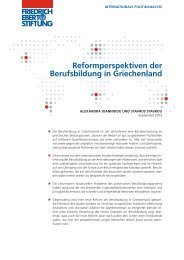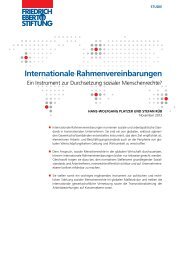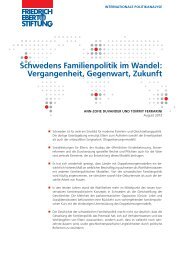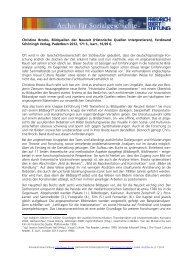Women - men - gender. - Bibliothek der Friedrich-Ebert-Stiftung
Women - men - gender. - Bibliothek der Friedrich-Ebert-Stiftung
Women - men - gender. - Bibliothek der Friedrich-Ebert-Stiftung
You also want an ePaper? Increase the reach of your titles
YUMPU automatically turns print PDFs into web optimized ePapers that Google loves.
38<br />
POLITICS AND TRADE UNIONS<br />
Care-Work or what a precautionary social welfare state must do,<br />
so that <strong>men</strong> and wo<strong>men</strong> can live comfortably in their old-age<br />
Within the feminist discourse, the concept of<br />
“care” covers paid and unpaid work, which comprise<br />
caring for dependents (be they old, ill or disabled).<br />
Politics determines the scope and the type<br />
of care provided. It specifi es private and public<br />
responsibilities, it stipulates what constitutes paid<br />
work and what does not and defi nes the rights of<br />
care-givers and care-receivers.<br />
In the programmes of every party, there are many<br />
state<strong>men</strong>ts devoted to providing child care but<br />
hardly any to those who need care and ministering.<br />
On the other hand, trade unions, through<br />
their campaigns (ver.di: ”We’ve had enough!”), are<br />
drawing attention to the new crisis emerging in<br />
this area, due to a paucity of care-givers. At the<br />
political level, however, as in the past, there are<br />
only discussions on the need for change in the fi eld<br />
of nursing care. Experts feel that the problem with<br />
the German care system lies, above all, in the fact<br />
that the debate is shaped by stakehol<strong>der</strong>s, those<br />
providing care or those from the social insurance<br />
German Fe<strong>der</strong>al Minister for Health Ulla Schmidt presents<br />
the FES study “Gen<strong>der</strong> in Care Giving” by Dr. Gertrud Backes<br />
(right). On the left is Dr. Barbara Stiegler, the Head of the<br />
Depart<strong>men</strong>t for Gen<strong>der</strong> and <strong>Wo<strong>men</strong></strong>’s Policy at FES.<br />
sector. There is no comprehensive vision and<br />
neither is there a plan, supported and sustained by<br />
politics for evolving a policy on nursing care in the<br />
future.<br />
The present care system in Germany is fragile and<br />
this will become even more so in the future. The<br />
following trends are contributing to this situation:<br />
<strong>Wo<strong>men</strong></strong> of every age are increasingly taking up<br />
jobs. As a result the dual burden of nursing and<br />
working will increase.<br />
The increasing pressures of mobility and fl exibility<br />
at work, which will make the daily caring for<br />
those who require care at a certain place and at<br />
certain times increasingly impossible to accomplish.<br />
The low birth rates and the increasing numbers<br />
of childless couples. The consequence of this<br />
will be that nursing provided by relatives can no<br />
longer be guaranteed.<br />
The importance of marriage as a system for ensuring<br />
livelihood is decreasing. Life-long fi nancial<br />
support for female partners is no longer guaranteed<br />
and with this the security of having<br />
private nursing care fi nanced through matrimonial<br />
maintenance will disappear.<br />
The numbers of those requiring care will increase.<br />
By 2020, there will be another million<br />
people requiring regular nursing.<br />
Till today, economic prospects hardly play any<br />
role, when discussing the issue of providing care.<br />
Feminist economists have always la<strong>men</strong>ted this<br />
oversight on the part of traditional economics. The<br />
peculiarity of nursing care is that unlike industrial<br />
production and even many other services, it creates<br />
personal relationships. There is a particular<br />
logic un<strong>der</strong>lying this work and its productivity has<br />
to be defi ned differently from that of the production<br />
of industrial goods. In private care-giving, life<br />
FRIEDRICH-EBERT-STIFTUNG

















